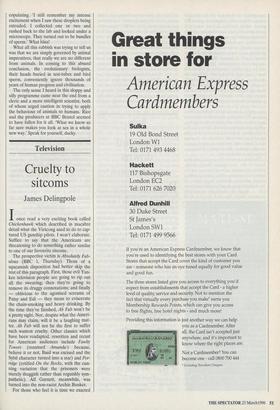Radio
Even fairy wrens do it
Michael Vestey
ABroadcasting House, the new Head of Sex, HS, has called a meeting.
HS: Sex. How do we do it?
Deputy Head of Sex, DHS: I'd have thought you'd have known that by now.
HS: Of course I know, Fiona. I've got two children. A programme about sex, I mean.
Chief Assistant to Head of Sex, CAHS (dream- ily): Animals. We're all animals really.
HS: Animals! Brill, Caroline. If we link it to animals we can get away with anything: grunting, orgasms, willies.
DHS: Bristol knows all about it.
HS (Not fully hearing): Bristols! Those too.
And that, no doubt, was how a new Radio Four series, The New Sexual Nature (Tuesdays) was born. The first of the four programmes last week was called 'Sperm Wars'; the second this week was 'The Good, the Bad and the Ugly'. They're about the way we choose mates. It is utter tripe from start to finish, full of scientific nerds from British universities, fresh — if that's the word — from peering up baboons' bottoms and babbling about `sperm competition'. I had an inkling of what sort of programme it would be from the various trails on Radio Four: they were full of titillating innuendo of the 'If you thought you knew about sex you're in for a shock'-type stuff.
Sure enough, the presenter Dr Gillian Rice, described as a GP, began by talking to the nerds, known apparently as evolu- tionary biologists, who regard us as just another species of animal. Rice told us: 'If you didn't think the shape of a dragonfly's penis or the spontaneous abortions of rodents had anything to do with you, then think again and stay tuned.'
Then it was, 'But first, let's get down to `You tell me about the "birds and the bees"
and I'll tell you about V-chip technology.' the nitty-gritty — sex.' A heroic nerd from Manchester University said that women were much more likely to have sex with their lover (i.e., bit on the side) during the fertile phase of their cycle. With their long- term partner (i.e., husband) they're more likely to have sex after they have ovulated, during their infertile period. This, he con- cluded, reflected a subconscious desire to mate with their lover because he had better genes and better sperm.
Rice gushed, 'Ten per cent of children are not sired by their supposed fathers.' How does she know? How does anyone? Even if true, it's one of those utterly use- less statistics pseudo-scientists love. But more drivel was to come, drivel so relent- less I thought it would break out of the radio set and begin hitting me around the head. Rice, desperately trying to popularise the subject, said, 'Don't worry, guys. Your penis is the perfect tool to ensure that even if your woman has sex with someone else, your sperm will be in with a fighting chance.' Was I really listening to an allegedly serious programme on Radio Four? Was it a spoof with French and Saunders, I wondered, scrabbling for the Radio Times?
The man from Manchester explained how the penis is used as a suction pump to remove semen deposited in our women by their lovers. 'So,' gasped Rice, 'the penis is an elaborate Hoover dustette!' A Sheffield University anorak explained how dragon- flies do it. 'There are two types of dragon- fly penis,' he said earnestly. Quite what this had to do with anything I wasn't sure, but Rice came to the rescue: 'But why are mate-guarding and fancy penises neces- Sary?' she asked. It's all to do with a theory called sperm competition.' The assumption was that male animals — and humans too — spend their time stopping other males fertilising their females.
A zoologist said he had applied DNA fingerprinting to what I think he said were `fairy wrens'. What! Lesbians in the Navy? No, they're promiscuous birds once wrong- ly thought of as monogamous. Wrens, we learnt, have the biggest balls in the world — for their overall size, at any rate. Per- haps they got fed up with being known as fairy wrens. When the nerds got to them they found that 15 per cent of the bird is testes.
We moved on to larger creatures apes. An Australian 'reproductive physiolo- gist' was invited to Bristol zoo to examine some sedated apes. As poor old Sampson the gorilla slumbered, he began searching for his willie. 'I was absolutely amazed . . • in spite of his enormous size, I couldn't find his external genitalia.' After much exploration, he found it; as the Sun might say, his manhood wasn't up to much. This revelation was meant to demonstrate that men with larger testes tend to engage in sperm competition more often. There was no privacy for dunnocks, either. One of the academics watched them copulating. 'I still remember my intense excitement when I saw these droplets being extruded. I collected one or two and rushed back to the lab and looked under a microscope. They turned out to be bundles of sperm.' What bliss!
What all this rubbish was trying to tell us was that we are simply governed by animal imperatives, that really we are no different from animals. In coming to this absurd conclusion, the evolutionary biologists, their heads buried in test-tubes and bird sperm, conveniently ignore thousands of years of human progress and civilisation.
The only sense I heard in this sloppy and silly programme came near the end from a cleric and a more intelligent scientist, both of whom urged caution in trying to apply the behaviour of animals to humans. Rice and the producers at BBC Bristol seemed to have fallen for it all. 'What we know so far sure makes you look at sex in a whole new way.' Speak for yourself, ducky.



































































 Previous page
Previous page